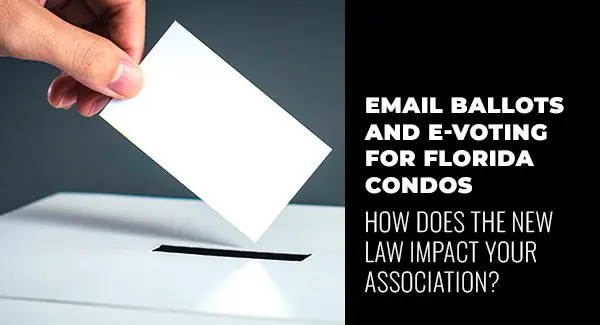- Community Associations, Legal Updates
- Florida
Effective July 1, 2025, Florida condominium associations will see significant changes in how unit owners can cast their votes during elections and membership decisions. Florida House Bill 913 introduces new statutory options for voting, including a new method of submitting signed ballots via email as well as updates to the existing electronic voting statute (under Florida Stat. § 718.128). These changes aim to modernize community association voting procedures, expand owner participation, and reinforce legal compliance.
New Option: Emailing Ballots Without Formal Electronic Voting
House Bill 913 creates a new subsection which allows Florida condominium unit owners to vote by submitting a signed ballot via email. This provision only applies to condominium associations that have not adopted a formal electronic voting resolution under the existing law. Under this new legislation:
- Associations must accept emailed ballots if they haven’t formally adopted electronic voting.
- The board must designate an email address where owners can send completed ballots.
- The emailed ballot must include the unit owner’s full name and unit number that serves as a digital signature.
- The emailed ballot must include a statutory disclaimer where the unit owner waives the secrecy of their ballot.
- The ballot must be received by the scheduled date and time of the meeting to be valid.
This new option is designed to offer a more accessible way for unit owners to vote, especially in associations that do not use secure online voting platforms. However, the requirement to accept emailed ballots brings logistical and recordkeeping challenges to board members.
Updates to the Existing Electronic Voting Statute
Florida House Bill 913 also amends the traditional electronic voting law that allows boards to adopt resolutions authorizing the use of electronic (online) voting systems. The bill introduces two key changes:
- Mandatory Implementation Upon Petition – If 25% or more of the voting interests in the association submit a written petition, the board is required to adopt a resolution authorizing electronic voting within 21 days.
- Elimination of the 14-Day Notice Requirement – Previously, associations were required to provide 14 days’ written notice before holding a board meeting to adopt a resolution allowing electronic voting. HB 913 removes this requirement.
Florida condominium associations that follow the formal electronic voting route must still:
- Adopt a resolution detailing procedures for opting in/out, authentication, and deadlines.
- Obtain written consent from each unit owner who wishes to vote electronically.
- Preserve ballot secrecy and ensure vote integrity.
What Should Associations Do Now?
Florida House Bill 913 introduces meaningful reforms that will modernize how condominium associations handle voting through traditional ballots, email submissions, and secure electronic voting platforms. While these changes offer increased flexibility and should promote greater owner participation, they also present new legal, procedural, and technological considerations.
Florida condominium association board members, property managers, and community leaders must take proactive steps to review their current voting procedures and adopt clear policies. They must also ensure that any ballots, proxies, or electronic systems in use comply with the updated law.
The community association’s legal counsel should be consulted to ensure consistency with both the new legislation and the association’s governing documents. By working with experienced legal counsel, boards can navigate these changes confidently, avoid costly mistakes, and maintain the integrity of the association’s governance process.
Questions about these recent legislative updates, elections, voting, or other association legal issues? Do not hesitate to contact our law firm.
Please call 855-537-0500 or visit www.ksnlaw.com.
Since 1983, KSN has been a legal resource for condominium, homeowner, and townhome associations. Additionally, we represent clients in real estate transactions, collections, landlord/tenant issues, and property tax appeals. We represent thousands of clients and community associations throughout the US with offices in several states including Florida, Illinois, Indiana, and Wisconsin.
Please note the material contained in this article is for educational and informational purposes only and does not constitute legal advice. No attorney-client relationship is established by your review or receipt of the information contained in this article. You should not act on the information discussed in this article without first obtaining legal advice from an attorney duly licensed to practice law in your State. While KSN has made every effort to include up-to-date information in this article, the law can change quickly. Accordingly, please understand that information discussed in this article may not yet reflect the most recent legal developments. Material is not guaranteed to be correct, complete, or up to date. KSN reserves the right to revise or update the information and statements of law discussed in the article law at any time, without notice, and disclaims any liability for your use of information or statements of law discussed on the article, or the accessibility of the article generally. This article may be considered advertising in some jurisdictions under applicable law/s and/or ethical rules/regulations. © 2025 Kovitz Shifrin Nesbit, A Professional Corporation.


